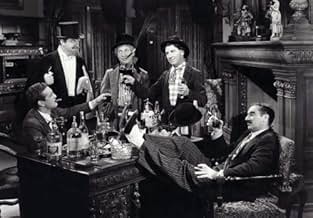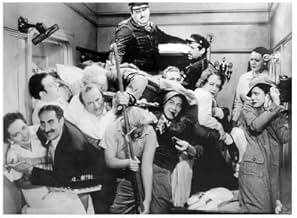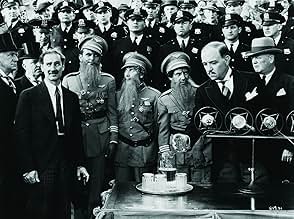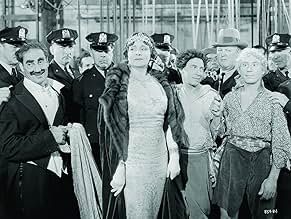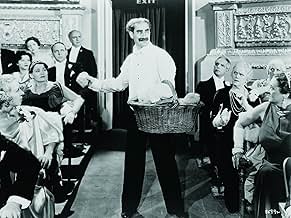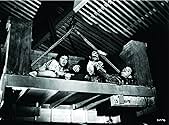IMDb-BEWERTUNG
7,8/10
35.822
IHRE BEWERTUNG
Ein gerissener Geschäftsführer und die beiden schrulligen Freunde von zwei Opernsängern verhelfen diesen zum Erfolg, indem sie deren spießige und versnobte Feinde demütigen.Ein gerissener Geschäftsführer und die beiden schrulligen Freunde von zwei Opernsängern verhelfen diesen zum Erfolg, indem sie deren spießige und versnobte Feinde demütigen.Ein gerissener Geschäftsführer und die beiden schrulligen Freunde von zwei Opernsängern verhelfen diesen zum Erfolg, indem sie deren spießige und versnobte Feinde demütigen.
- Auszeichnungen
- 3 wins total
Walter Woolf King
- Rudolfo Lassparri
- (as Walter King)
Sig Ruman
- Herman Gottlieb
- (as Siegfried Rumann)
Robert Emmett O'Connor
- Police Sergeant Henderson
- (as Robert Emmet O'Connor)
Enrique Acosta
- Nightclub Guest
- (Nicht genannt)
Harry Adams
- Opera Spectator
- (Nicht genannt)
Harry Allen
- Doorman
- (Nicht genannt)
Sam Appel
- Dungeon Guard
- (Nicht genannt)
King Baggot
- Dignitary
- (Nicht genannt)
Marion Bell
- Lady looking for 'Aunt Minnie'
- (Nicht genannt)
Edna Bennett
- Maid
- (Nicht genannt)
Dolly Blackburn
- Little Girl watching Harpo playing
- (Nicht genannt)
Zusammenfassung
Reviewers say 'A Night at the Opera' is celebrated for its iconic comedic routines and the Marx Brothers' unique blend of verbal and physical comedy. Groucho's wit, Chico's musical talents, and Harpo's slapstick humor are highlighted. Margaret Dumont's role and musical numbers add entertainment value, though some criticize their integration. The film is praised for its production quality and subversion of high society norms. However, a perceived shift towards more structured comedy marks the beginning of a decline in their later works.
Empfohlene Bewertungen
I must admit that I am very light in personal knowledge of MArx Brothers films,and aside from the general information,imagery and quotes(the majority of which came from the irrepressible Groucho)that have been used and attributed in Western culture over the last seventy or eighty odd years,I have a very scant referential knowledge of their legendary body of film work.
With that in mind,when I saw the public library had a copy of this film in its stacks,it was a no-brainer for me. And it was a largely pleasing film experience as well.
The storyline seems to be somewhat insignificant: Brothers MArx are scattered about the goings on at a Venetian Opera company as it moves from Europe to New York City. They conspire to break a humble but talented tenor into the main role of the traveling show,as he is mooning over the young ingénue(Kitty Carlisle Hart,WELL before becoming the grand dame of TV Panel game shows!). But aside from the fair amount of music(hey,this IS,after all set in an Opera,so it goes to reason),this is mostly a physical comedy,laced with plenty of Groucho's standard one-liners. From watching his dealings with various straight people,from old stand-by MArgaret Dumont as his society-climbing wife,to the various lugs who signify authority(Theater directors,producers,society bigwigs,ship crew,policemen,local magistrates,etc.),Groucho is not only able to keep the humor legendarily fast and loose but also keeps the tempo of the dialog from bogging(I even noticed a sort of inspiration the creators at WArner Brothers got for Bugs Bunny from Groucho's witticisms!).
Maybe not the best of the Marxes films--though I still don't have a real gauge of opinion on this yet--but it's a fantastic starter film to build familiarity.
With that in mind,when I saw the public library had a copy of this film in its stacks,it was a no-brainer for me. And it was a largely pleasing film experience as well.
The storyline seems to be somewhat insignificant: Brothers MArx are scattered about the goings on at a Venetian Opera company as it moves from Europe to New York City. They conspire to break a humble but talented tenor into the main role of the traveling show,as he is mooning over the young ingénue(Kitty Carlisle Hart,WELL before becoming the grand dame of TV Panel game shows!). But aside from the fair amount of music(hey,this IS,after all set in an Opera,so it goes to reason),this is mostly a physical comedy,laced with plenty of Groucho's standard one-liners. From watching his dealings with various straight people,from old stand-by MArgaret Dumont as his society-climbing wife,to the various lugs who signify authority(Theater directors,producers,society bigwigs,ship crew,policemen,local magistrates,etc.),Groucho is not only able to keep the humor legendarily fast and loose but also keeps the tempo of the dialog from bogging(I even noticed a sort of inspiration the creators at WArner Brothers got for Bugs Bunny from Groucho's witticisms!).
Maybe not the best of the Marxes films--though I still don't have a real gauge of opinion on this yet--but it's a fantastic starter film to build familiarity.
No doubt that "A Night at the Opera" is right up there with "Duck Soup" as the best Marx Brothers movie. Some Marx-purists complain "ANatO" is when the brothers started to grow soft and their quality started to decline. For one thing, instead of ridiculing romantic couples (the love story subplot plays a big part), they support them. Also, it's not as surreal or satirical as their past films. To those purists, I say: Lighten up! "ANatO" is just as funny as anything the Marx Bros did in the past (heck, I think it's funnier than "Monkey Business"), and it's withstood the test of time perfectly. In fact, "ANatO" is said to be Groucho's favorite; he even called his previous films "duds"! The film is filled with jabs at the upper class and double entendres courtesy of Groucho. Sample:
Mrs. Claypool: Do you have everything, Otis?
Otis: I haven't had any complaints yet!
The love story subplot isn't as nauseating as 1937's "A Day at the Races". Allan Jones may be a bit too mushy, but Kitty Carlisle, the love interest, is cool and calm enough to help it go down easily (that's really her singing, by the way). Chico and Harpo have some inspired moments, such as their gleeful butchering of "Il Travotore" (sp?). The hapless villains are the funniest Marx foils ever, and the finale is just uproarious. "ANatO" is a wonderfully silly romp, and it's rather harmless, so kids can probably watch and enjoy it. The famous stateroom scene is nothing short of brilliant, and you'll find yourself humming along to "Cosi Cosa" (I just wish the ballad "Alone" had been left, well, alone). Don't miss this hilarious masterpiece. And now, on with the opera!!
Mrs. Claypool: Do you have everything, Otis?
Otis: I haven't had any complaints yet!
The love story subplot isn't as nauseating as 1937's "A Day at the Races". Allan Jones may be a bit too mushy, but Kitty Carlisle, the love interest, is cool and calm enough to help it go down easily (that's really her singing, by the way). Chico and Harpo have some inspired moments, such as their gleeful butchering of "Il Travotore" (sp?). The hapless villains are the funniest Marx foils ever, and the finale is just uproarious. "ANatO" is a wonderfully silly romp, and it's rather harmless, so kids can probably watch and enjoy it. The famous stateroom scene is nothing short of brilliant, and you'll find yourself humming along to "Cosi Cosa" (I just wish the ballad "Alone" had been left, well, alone). Don't miss this hilarious masterpiece. And now, on with the opera!!
Groucho Marx is in his element as slick, fast talking business manager Otis B. Driftwood, who spends his time playing up to arts patron Mrs. Claypool (classic Marx Bros. foil Margaret Dumont). When he sees that she's willing to pony up $1,000 a night to have pompous Lassparri (Walter Woolf King) sing, he wants a piece of the action. Circumstance soon throws him together with equally sly Fiorello (Chico) and goofy Tomasso (Harpo), as they become determined to help out young lovers & aspiring opera stars Rosa (Kitty Carlisle) and Ricardo (Allan Jones).
Even if one is not a fan of the opera, they shouldn't let that dissuade them from checking out the Marx Bros. in their glory. Some buffs consider this their best film, and it certainly shows off their talents to memorable effect. Musical interludes do go on a bit long, but the quality of the comedy when it occurs is top notch. There are some truly great bits in here, like the "party of the first part" contract, the overcrowded (to say the least) stateroom sequence, and the frantic, farcical efforts of Otis, Fiorello, Tomasso, and Ricardo to pull the wool over the eyes of a suspicious inspector (Robert Emmett O'Connor) by moving beds from one room to another.
Groucho is hilarious, as always. Very few entertainers in film history can fire off a one-liner as snappily as he does. Chico and Harpo have their wonderful moments, as well. (It's such a hoot when Harpo does a Spider-Man routine near the end.) Carlisle and Jones are extremely appealing, Dumont is once again a fine "straight woman", King is an appropriately snooty villain, Sig Ruman is superb as eternally frustrated Gottlieb, and O'Connor is likewise good as the antics of Otis and company take a toll on him.
The pace isn't always consistent, but there is some enjoyable action and first rate stunt work. Overall, this is a solid comedy / musical that will appeal to any lover of this era in cinema.
Eight out of 10.
Even if one is not a fan of the opera, they shouldn't let that dissuade them from checking out the Marx Bros. in their glory. Some buffs consider this their best film, and it certainly shows off their talents to memorable effect. Musical interludes do go on a bit long, but the quality of the comedy when it occurs is top notch. There are some truly great bits in here, like the "party of the first part" contract, the overcrowded (to say the least) stateroom sequence, and the frantic, farcical efforts of Otis, Fiorello, Tomasso, and Ricardo to pull the wool over the eyes of a suspicious inspector (Robert Emmett O'Connor) by moving beds from one room to another.
Groucho is hilarious, as always. Very few entertainers in film history can fire off a one-liner as snappily as he does. Chico and Harpo have their wonderful moments, as well. (It's such a hoot when Harpo does a Spider-Man routine near the end.) Carlisle and Jones are extremely appealing, Dumont is once again a fine "straight woman", King is an appropriately snooty villain, Sig Ruman is superb as eternally frustrated Gottlieb, and O'Connor is likewise good as the antics of Otis and company take a toll on him.
The pace isn't always consistent, but there is some enjoyable action and first rate stunt work. Overall, this is a solid comedy / musical that will appeal to any lover of this era in cinema.
Eight out of 10.
"A Night at the Opera" is one of those films you can see dozens of times and laugh just as hard as you did the first time. The brothers get mixed up with an opera company and a divo and diva in love - Allan Jones and Kitty Carlisle, and trying to get the two to perform together.
The one-liners come so fast - you keep thinking you'll remember them, but one is funnier than the next. I do remember what Groucho says when he sees the gypsy Azucena in the opera, however. "How would you like to feel how she looks?" The stateroom scene is, of course, a classic, and my favorite part is when Groucho tells the housekeeper, "I want two pillows on that bed" and Harpo sound asleep and being moved everywhere, including onto a tray of food.
But nothing beats the last half hour - the performance of "Il Trovatore" with Harpo using the stage ropes like Tarzan, and Chico playing baseball in the orchestra while Groucho sells peanuts. They have replaced part of the overture with "Take Me Out to the Ball Game."
Allan Jones plays the tenor Ricardo Baroni who is hoping for his break. Why they cast the blond Jones as a tenor named Baroni - well, there you go. He sings very well and is quite handsome. Kitty Carlisle is the diva waiting, petite and pretty and singing music out of her vocal type, with the exception of "Alone." "Stridono lassu" and Leonora in Trovatore were both much too heavy for her. She does sing well and what a woman - she's still alive and recently performed at a New York supper club recently at the age of 95.
The only problem with any Marx Brothers film is that when they aren't in front of the camera, suddenly their films become very slow. Because I was trained in opera and have some interest in it, this was less the case than with some of their other films. They were too magical, too energetic, and too darn funny to ever share a spotlight with anyone else. Thank goodness they did, though, as they left us with many treasures. This is one.
The one-liners come so fast - you keep thinking you'll remember them, but one is funnier than the next. I do remember what Groucho says when he sees the gypsy Azucena in the opera, however. "How would you like to feel how she looks?" The stateroom scene is, of course, a classic, and my favorite part is when Groucho tells the housekeeper, "I want two pillows on that bed" and Harpo sound asleep and being moved everywhere, including onto a tray of food.
But nothing beats the last half hour - the performance of "Il Trovatore" with Harpo using the stage ropes like Tarzan, and Chico playing baseball in the orchestra while Groucho sells peanuts. They have replaced part of the overture with "Take Me Out to the Ball Game."
Allan Jones plays the tenor Ricardo Baroni who is hoping for his break. Why they cast the blond Jones as a tenor named Baroni - well, there you go. He sings very well and is quite handsome. Kitty Carlisle is the diva waiting, petite and pretty and singing music out of her vocal type, with the exception of "Alone." "Stridono lassu" and Leonora in Trovatore were both much too heavy for her. She does sing well and what a woman - she's still alive and recently performed at a New York supper club recently at the age of 95.
The only problem with any Marx Brothers film is that when they aren't in front of the camera, suddenly their films become very slow. Because I was trained in opera and have some interest in it, this was less the case than with some of their other films. They were too magical, too energetic, and too darn funny to ever share a spotlight with anyone else. Thank goodness they did, though, as they left us with many treasures. This is one.
"A Night at the Opera" is great Marx Brothers entertainment. It has comedy, music, and a good cast - everything except Zeppo, who by this time had left the act. It fully deserves its reputation as one of the two best Marx Brothers films, along with "Duck Soup".
"A Night at the Opera" is probably slightly less funny than "Duck Soup" (it is no criticism to say that of any film), but it has more of a story to connect the great comic bits. There is a good supporting cast in both films - here Sig Ruman is especially funny, in addition to the perennial Margaret Dumont. It also has several fairly long musical interludes - some are operatic, but the most entertaining is Chico and Harpo's impromptu shipboard entertainment.
Of course, the real attraction in any of these films is the comedy, and there are some memorable bits in this one. The contract negotiations between Chico and Groucho, and the scene in Groucho's stateroom, are especially hilarious, and you have to see the stateroom scene more than once to catch everything. And for sustained zany humor, the climactic sequence at the opera might be the funniest part of all.
This is certainly a must for Marx Brothers fans.
"A Night at the Opera" is probably slightly less funny than "Duck Soup" (it is no criticism to say that of any film), but it has more of a story to connect the great comic bits. There is a good supporting cast in both films - here Sig Ruman is especially funny, in addition to the perennial Margaret Dumont. It also has several fairly long musical interludes - some are operatic, but the most entertaining is Chico and Harpo's impromptu shipboard entertainment.
Of course, the real attraction in any of these films is the comedy, and there are some memorable bits in this one. The contract negotiations between Chico and Groucho, and the scene in Groucho's stateroom, are especially hilarious, and you have to see the stateroom scene more than once to catch everything. And for sustained zany humor, the climactic sequence at the opera might be the funniest part of all.
This is certainly a must for Marx Brothers fans.
Wusstest du schon
- WissenswertesIn exasperation after several attempts to have Groucho Marx read one of his lines in the manner director Sam Wood had requested, Wood exclaimed, "I guess you just can't make an actor out of clay." Groucho Marx instantly responded, "Nor a director out of Wood."
- PatzerRicardo is clearly standing on the dock as the ship pulls away, yet he turns up on board later as a stowaway.
- Zitate
Otis B. Driftwood: It's all right, that's in every contract. That's what they call a sanity clause.
[Fiorello laughs loudly]
Fiorello: You can't fool me! There ain't no Sanity Claus!
- Alternative VersionenAll references to the first portion of the film taking place in Italy were edited from the original negative sometime after the original release. There is speculation that this was done during WWII when Italy was as Axis power, but it also may have been done in the late 1930's to appease Mussolini, who didn't like the way Italians were being portrayed. Either way, the film's first scene begins rather abruptly and is missing a musical number and references to Milan, Italy.
- VerbindungenEdited into Apaga y vámonos: Folge #1.5 (2013)
- SoundtracksIl Trovatore: Di quella pira
(1853) (uncredited)
Music by Giuseppe Verdi
Libretto by Leone Emanuele Bardare and Salvatore Cammarano
Sung by Walter Woolf King
with The MGM Symphony Orchestra
Top-Auswahl
Melde dich zum Bewerten an und greife auf die Watchlist für personalisierte Empfehlungen zu.
Details
- Erscheinungsdatum
- Herkunftsland
- Sprachen
- Auch bekannt als
- A Night at the Opera
- Drehorte
- Produktionsfirma
- Weitere beteiligte Unternehmen bei IMDbPro anzeigen
Box Office
- Weltweiter Bruttoertrag
- 8.953 $
- Laufzeit
- 1 Std. 36 Min.(96 min)
- Farbe
- Seitenverhältnis
- 1.37 : 1
Zu dieser Seite beitragen
Bearbeitung vorschlagen oder fehlenden Inhalt hinzufügen



